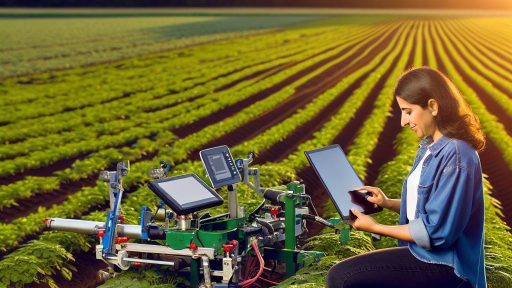Introduction to Sustainable Agriculture and its Importance
Sustainable agriculture refers to practices that meet current food needs.
It also aims to preserve the environment for future generations.
This approach focuses on ecological balance, promoting health and biodiversity.
Farmers adopt sustainable methods to combat climate change.
These practices can reduce greenhouse gas emissions and conserve resources.
Moreover, sustainable agriculture supports social equity and local economies.
It provides access to healthy food in underserved communities.
Sustainability ensures that agricultural systems are resilient and adaptable.
This is crucial as global populations and food demands grow.
Integrating biotechnology innovations can enhance sustainable practices.
For example, biotechnology can improve crop yields and resistance to pests.
As a result, farmers can increase productivity without depleting resources.
Biotechnology also supports reduced reliance on chemical pesticides.
Consequently, sustainable agriculture practices lead to healthier ecosystems.
Farmers and scientists must collaborate to advance these methods.
Transform Your Agribusiness
Unlock your farm's potential with expert advice tailored to your needs. Get actionable steps that drive real results.
Get StartedWorking together can foster innovative solutions to agricultural challenges.
Sustainable agriculture significantly impacts food security and health.
Overview of Biotechnology Innovations in Agriculture
Introduction to Biotechnology in Agriculture
Biotechnology revolutionizes agriculture by introducing novel techniques and processes.
This innovation enhances crop yield and resilience against pests.
Farmers increasingly adopt these technologies for sustainable practices.
Key Innovations Shaping Agriculture
Genetic engineering leads the way in agricultural advancements.
This process modifies the genetic makeup of crops for desired traits.
Crops with increased resistance to diseases emerge from this technology.
Additionally, genetically modified organisms (GMOs) offer drought resistance.
Bioremedation techniques also play a significant role in sustainable farming.
Benefits of Biotechnology in Farming
- Higher crop productivity helps to meet food demands worldwide.
- Reduced pesticide usage promotes environmental health.
- Enhanced nutritional content supports public health initiatives.
- Improved soil health reduces the need for chemical fertilizers.
Challenges and Considerations
Despite the advantages, challenges remain in public perception of biotechnology.
Consumer concerns about GMOs impact market acceptance.
Furthermore, regulatory hurdles complicate the adoption of biotechnological solutions.
It is essential to provide education about the safety and benefits of these innovations.
The Future of Biotechnology in Agriculture
Research continues to explore new biotechnological solutions.
Innovations like CRISPR technology offer precise genome editing.
This advancement holds the promise of developing more resilient crops.
Future strategies will focus on sustainability and ecological balance.
Genetic Engineering: Enhancing Crop Resilience and Yield
The Role of Genetic Engineering
Genetic engineering significantly impacts agriculture today.
This technology allows scientists to modify plant genes directly.
As a result, crops can thrive in challenging environments.
Also, farmers can produce higher yields with fewer inputs.
Improving Resilience to Climate Change
Climate change poses severe challenges to global agriculture.
Through genetic engineering, crops can adapt to changing conditions.
Showcase Your Farming Business
Publish your professional farming services profile on our blog for a one-time fee of $200 and reach a dedicated audience of farmers and agribusiness owners.
Publish Your ProfileFor instance, scientists modify genes for drought resistance.
Such advancements enhance water use efficiency in crops.
Additionally, heat-resistant varieties help farmers cope with rising temperatures.
Boosting Nutritional Value
Genetic engineering not only improves resilience—it also enhances nutrition.
Crops like golden rice contain increased vitamin A levels.
This fortification addresses significant health issues in developing countries.
Moreover, biofortified crops can combat malnutrition effectively.
Reducing the Need for Pesticides
Many genetically engineered crops are resistant to pests.
For example, Bt corn produces its own pest-repelling protein.
This reduces reliance on chemical pesticides significantly.
Consequently, it leads to lower production costs for farmers.
Additionally, it minimizes environmental impacts associated with pesticide use.
Supporting Sustainable Farming Practices
Genetic engineering aligns with sustainable agriculture goals.
It promotes efficient resource use while maintaining high productivity.
Farmers can cultivate crops that require fewer fertilizers and herbicides.
As a result, they protect both soil health and biodiversity.
Such practices help ensure agricultural sustainability for future generations.
Uncover the Details: Benefits Of Using Farm Management Software On Modern Farms
Biopesticides and Biofertilizers: Reducing Chemical Use
Introduction to Biopesticides
Biopesticides offer a sustainable alternative to chemical pesticides.
They are derived from natural materials like plants, bacteria, and minerals.
These biological agents help control pests and diseases effectively.
Consequently, they minimize harm to non-target organisms and ecosystems.
Types of Biopesticides
Biopesticides can be classified into three main categories.
- Microbial pesticides utilize microorganisms to suppress pest populations.
- Plant-based pesticides come from plant extracts and oils.
- Biochemical pesticides feature naturally occurring substances to disrupt pest life cycles.
Each type has unique advantages and applications in agriculture.
Benefits of Biopesticides
Using biopesticides significantly reduces chemical pesticide reliance.
They are often more specific, which protects beneficial insects.
Additionally, they can enhance soil health and biodiversity.
Farmers notice improved crop resilience and yields over time.
Introduction to Biofertilizers
Biofertilizers enhance soil fertility naturally and sustainably.
They contain living microorganisms that promote plant growth.
These include bacteria, fungi, and cyanobacteria.
With regular use, biofertilizers improve soil structure and nutrient availability.
Types of Biofertilizers
Various types of biofertilizers cater to different needs.
- Azospirillum promotes nitrogen uptake in plants.
- Rhizobia form symbiotic relationships with legumes, enhancing their growth.
- Ectomycorrhizal fungi increase nutrient absorption efficiency.
Understanding these types allows farmers to select the right biofertilizer for their crops.
Benefits of Biofertilizers
Biofertilizers contribute to sustainable agricultural practices.
They help reduce chemical fertilizer use, lowering production costs.
Moreover, they enhance soil microbial diversity and health.
Farmers experience reduced environmental pollution and improved crop quality.
Integrating Biopesticides and Biofertilizers
Combining biopesticides and biofertilizers leads to synergistic benefits.
This integration enhances soil health while protecting crops from pests.
Showcase Your Farming Business
Publish your professional farming services profile on our blog for a one-time fee of $200 and reach a dedicated audience of farmers and agribusiness owners.
Publish Your ProfileFarmers can cultivate healthier ecosystems and achieve higher yields simultaneously.
This represents a holistic approach to sustainable agriculture.
Gain More Insights: Using Drones To Optimize Farm Productivity
Precision Agriculture: Technology for Efficient Resource Use
Understanding Precision Agriculture
Precision agriculture utilizes technology to enhance farming practices.
This method focuses on monitoring and managing field variability.
Consequently, farmers optimize their inputs and improve yields.
Key Technologies in Precision Agriculture
Several technologies drive precision agriculture forward.
For instance, GPS technology aids in precise field mapping.
Additionally, drones provide aerial imagery for monitoring crops.
Sensors measure soil moisture and crop health effectively.
Moreover, data analytics processes information for better decision-making.
Benefits of Precision Agriculture
The advantages of precision agriculture are significant.
First, it increases crop productivity by optimizing inputs.
Second, it reduces waste by applying resources more efficiently.
Furthermore, this method lowers the environmental impact of farming.
Farmers can also save on time and labor costs.
Challenges in Implementing Precision Agriculture
Despite its benefits, challenges exist in implementing precision agriculture.
First, high initial costs can deter many farmers.
Moreover, technical know-how is necessary for effective use.
Additionally, data management can be overwhelming for some.
Lastly, connectivity issues may hinder real-time monitoring.
Future of Precision Agriculture
The future of precision agriculture looks promising.
Emerging technologies such as AI and machine learning will enhance efficiency.
These innovations will allow for even more precise farming techniques.
Additionally, a focus on sustainability will drive further advancements.
Ultimately, precision agriculture will play a vital role in food security.
Discover More: Blockchain For Ethical Sourcing In Agricultural Supply Chains
Sustainable Livestock Management through Biotechnological Advances
Enhancing Animal Health
Biotechnology plays a vital role in improving animal health.
It offers innovative solutions to reduce diseases among livestock.
For instance, genetic engineering can enhance resistance to specific infections.
Additionally, biotechnological vaccines can offer long-lasting protection.
Optimizing Feed Efficiency
Efficient feed utilization directly impacts livestock productivity.
Biotech innovations help develop feed additives that enhance nutrient absorption.
These additives can improve growth rates while reducing waste output.
Consequently, animals require less feed to achieve optimal growth levels.
Reducing Environmental Impact
Sustainable livestock management reduces the carbon footprint.
Biotechnology aids in creating animals that emit fewer greenhouse gases.
Moreover, it facilitates the development of more efficient waste management practices.
This leads to a decrease in harmful environmental pollutants.
Improving Reproductive Efficiency
Advanced reproductive technologies enhance breeding success rates.
Showcase Your Farming Business
Publish your professional farming services profile on our blog for a one-time fee of $200 and reach a dedicated audience of farmers and agribusiness owners.
Publish Your ProfileFor example, artificial insemination and embryo transfer are widely used.
These methods allow farmers to produce healthier offspring in shorter timeframes.
Consequently, livestock productivity improves on a larger scale.
Promoting Ethical Practices
Biotechnology enables more humane practices in livestock management.
By enhancing animal welfare, farmers can maintain ethical production standards.
Additionally, innovative monitoring systems ensure optimal living conditions.
Farmers can track animal health and well-being continuously.
Adoption of Precision Agriculture
Precision agriculture improves decision-making in livestock management.
Biotech tools provide real-time data on animal performance and health.
This allows for tailored interventions to maximize efficiency.
Farmers can make informed choices about care and resources.
You Might Also Like: Machine Learning Applications In Farming

Case Studies: Successful Implementation of Biotechnology in Agriculture
Corn Production Enhancements
In 2016, AgriBio Solutions developed a genetically modified corn variety.
This variety was resistant to both pests and drought conditions.
Farmers who adopted this corn saw yield increases of 30 percent.
Moreover, the reduction in pesticide use minimized environmental impact.
Improved Soybean Varieties
In 2019, GreenHarvest Genetics introduced an improved soybean strain.
This strain offered enhanced resistance to common diseases.
As a result, farmers experienced a marked decrease in crop loss.
Furthermore, the new soybean required less herbicide for effective weed control.
Rice Genome Research
Research from the International Rice Research Institute achieved significant milestones.
Scientists used CRISPR technology to enhance rice nutrition.
They targeted genes that increase essential vitamins and minerals.
This advancement could potentially combat malnutrition in developing countries.
Tomato Flavor Enhancement
FlavorFresh AgriTech focused on improving tomato flavors through biotech.
They identified and enhanced flavor genes in existing tomato varieties.
Farmers reported increased consumer satisfaction and improved sales.
This project demonstrates the economic benefits of flavor improvement.
Biopesticides in Action
Agricultural Enterprise Corp launched their biopesticide products in 2020.
These products are derived from natural organisms to combat pests.
Early adopters saw reduced pest populations without harming beneficial insects.
This approach presents a sustainable alternative to traditional pesticides.
Challenges and Ethical Considerations in Agricultural Biotechnology
Adoption Barriers
Many farmers hesitate to adopt biotechnology due to perceived risks.
They often lack access to necessary education and resources.
Moreover, regulatory hurdles can deter potential adopters.
Ecosystem Impact
Biotechnology can disrupt local ecosystems if not managed properly.
This disruption might lead to loss of biodiversity.
Consequently, farmers face challenges in maintaining ecological balance.
Food Safety Concerns
Consumers express concerns about the safety of genetically modified organisms (GMOs).
They worry about potential health risks associated with GMOs.
Showcase Your Farming Business
Publish your professional farming services profile on our blog for a one-time fee of $200 and reach a dedicated audience of farmers and agribusiness owners.
Publish Your ProfileTransparency in labeling can help alleviate these concerns.
Socioeconomic Implications
Biotechnology may widen the gap between wealthy and poor farmers.
Access to technology is often limited for small-scale farmers.
This limitation can lead to economic disparities.
Ethical Considerations
Ethical debates arise over the manipulation of living organisms.
Some argue that altering genetics crosses a moral line.
Others advocate for responsible innovation in agriculture.
Intellectual Property Issues
Patents on biotechnology can restrict farmers’ rights.
Farmers may face legal challenges if they use patented seeds unknowingly.
Such issues complicate the relationship between innovators and farmers.
Global Food Security
Biotechnology offers solutions to enhance food security worldwide.
Despite this, challenges related to access and acceptance remain.
Equitable distribution of biotechnological advancements is essential.
Regulatory Frameworks
Robust regulatory frameworks are necessary to govern biotechnology.
Effective regulations ensure safety and promote innovation.
Collaboration between governments and stakeholders is crucial.
Future Trends: The Role of AI and Data Analytics in Sustainable Agriculture
Integrating Technology in Farming Practices
Today, farmers are increasingly adopting AI technologies in their operations.
These innovations help optimize resource use and improve crop yields.
Moreover, farmers can harness data analytics to monitor soil health.
This proactive approach minimizes wastage and enhances productivity.
Predictive Analytics for Crop Management
AI-driven predictive analytics offers valuable insights into crop management.
Farmers can anticipate weather changes and adjust planting schedules accordingly.
This adaptability helps mitigate risks and secures harvests.
Additionally, predictive models assist in detecting pest outbreaks early.
As a result, farmers can implement targeted intervention strategies.
Precision Agriculture Through Data Insights
Data analytics enables precision agriculture practices.
Farmers can now tailor their approach to meet specific needs of each plant.
This customization reduces overuse of fertilizers and pesticides.
Consequently, it promotes biodiversity and healthier ecosystems.
Enhancing Supply Chain Efficiency
AI helps streamline agricultural supply chains from farm to table.
Real-time data tracking ensures timely deliveries and reduces spoilage.
Furthermore, it fosters transparency that builds consumer trust.
Collaboration and Innovation Among Stakeholders
Collaboration is vital for advancing sustainable agriculture.
Farmers, tech companies, and researchers must work together.
Such partnerships can drive innovation and share best practices.
As an example, initiatives like the AgTech Innovation Summit encourage dialogue.
The Future of Sustainable Farming
Looking ahead, AI and data analytics will transform agriculture further.
Farmers will rely more on technology to enhance resilience and sustainability.
This evolution promises to ensure food security for future generations.
Ultimately, innovation paves the way for a more sustainable agricultural landscape.
Showcase Your Farming Business
Publish your professional farming services profile on our blog for a one-time fee of $200 and reach a dedicated audience of farmers and agribusiness owners.
Publish Your ProfileAdditional Resources
Executive Order on Advancing Biotechnology and Biomanufacturing …




